As Korpel answered already, currently there is no actual inheritance supported for Enums. So it is not possible to have a certain Enum extend and inherit the cases of another enum.
However, I would add for completion, that Enums do support protocols, and together with protocol extensions introduced in Swift 2 and the new protocol-oriented programming approach (see this video), it is possible to implement something that resembles inheritance. This is a technique I use a lot to define UITableViewController:s driven by enums, to specify the sections of the table, and the rows within each section, and to add some useful behaviour. See for example the following sample code:
import UIKit
protocol TableSection {
static var rows: [Self] { get }
var title: String { get }
var mandatoryField: Bool { get }
}
extension TableSection {
var mandatoryTitle: String {
if mandatoryField {
return "\(title)*"
} else {
return title
}
}
}
enum RegisterTableSection: Int, TableSection {
case Username
case Birthdate
case Password
case RepeatPassword
static var rows: [RegisterTableSection] {
return [.Username, .Password, .RepeatPassword]
}
var title: String {
switch self {
case .Username:
return "Username"
case .Birthdate:
return "Date of birth"
case .Password:
return "Password"
case .RepeatPassword:
return "Repeat password"
}
}
var mandatoryField: Bool {
switch self {
case .Username:
return true
case .Birthdate:
return false
case .Password:
return true
case .RepeatPassword:
return true
}
}
}
class ViewController: UITableViewController {
override func viewDidLoad() {
super.viewDidLoad()
}
override func numberOfSectionsInTableView(tableView: UITableView) -> Int {
return 1
}
override func tableView(tableView: UITableView, numberOfRowsInSection section: Int) -> Int {
return RegisterTableSection.rows.count
}
override func tableView(tableView: UITableView, cellForRowAtIndexPath indexPath: NSIndexPath) -> UITableViewCell {
guard let row = RegisterTableSection(rawValue: indexPath.row) else {
// This should never happen
return UITableViewCell()
}
let cell = UITableViewCell()
cell.textLabel?.text = row.mandatoryTitle
return cell
}
}
The previous code would render the following table:

Notice how by implementing the protocol, our RegisterTableSection enum has to provide implementations to methods and variables defined in the protocol. And most interestingly, it inherits a default implementation of the variable mandatoryTitle through the TableSection protocol extension
I have uploaded the source code of this example here


